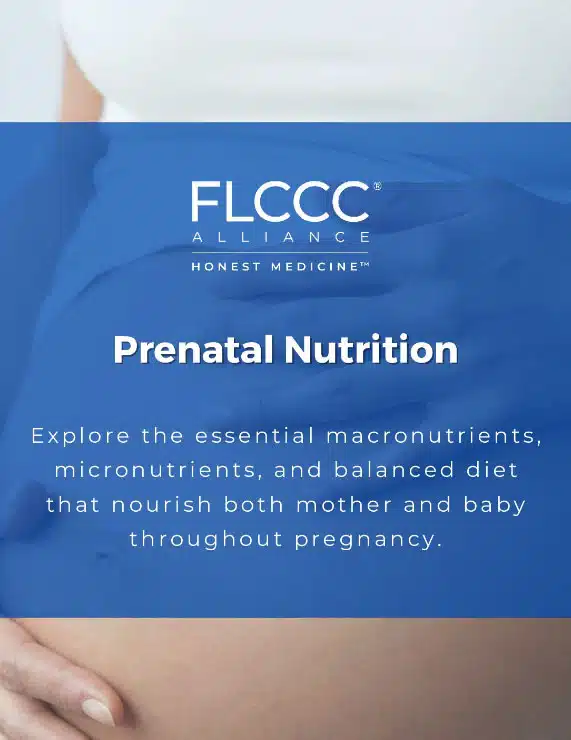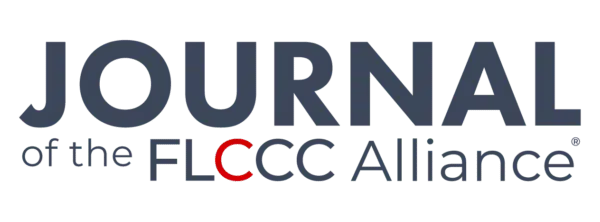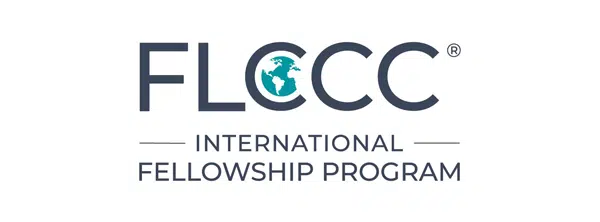Learn how to eat healthy during pregnancy with our essential guide to prenatal nutrition. Learn about vital nutrients, balanced food choices, and tips for a healthy pregnancy.
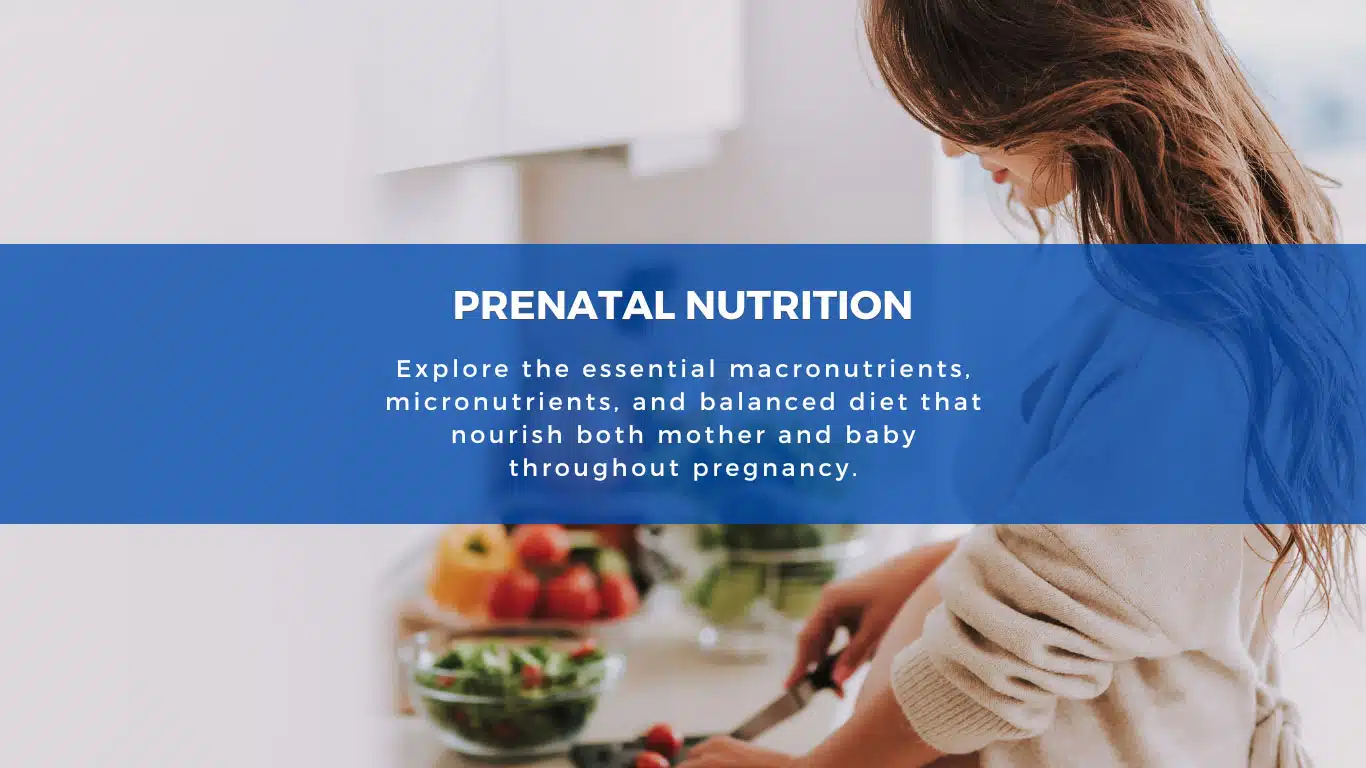
Did you know that proper nutrition during pregnancy can significantly affect your baby’s development and your own health? It might seem overwhelming, but understanding prenatal nutrition is crucial for both you and your baby. Good nutrition not only supports your well-being but also plays a vital role in your baby’s development—from the brain and spinal cord to bones and teeth.
Many women are not getting enough of the essential nutrients they need during pregnancy, which can lead to complications like neural tube defects and low birth weight. But don’t worry—we’re here to help.
In this comprehensive guide, FLCCC Senior Fellow Dr. Kristina Carman breaks down everything you need to know about nutrition during pregnancy. We’ll explore important nutrients, healthy food choices, and practical tips to ensure you and your baby get the nourishment you need throughout your pregnancy.
1. The Importance of Prenatal Nutrition
Maintaining a balanced diet prior to and throughout your pregnancy is crucial. Nutrient-rich foods will support your nutritional needs and establish reserves vital for your developing baby. Once you become pregnant, your needs shift quickly to accommodate the growing fetus. Cultivating healthy eating habits before and during pregnancy can significantly contribute to a successful and healthy pregnancy.
Nutrition during pregnancy plays a crucial role in the development of every body system, including the nervous system (comprising the brain and spinal cord), the immune system, and vital physiological processes such as metabolism.
Prior to pregnancy, maintaining a high-quality diet that includes sufficient macronutrients (carbohydrates, protein, and fat) as well as micronutrients (vitamins and minerals) is essential.
2. Key Nutrients for a Healthy Pregnancy
- Protein: Building Blocks for Your Baby
- Omega-3 Fatty Acids: Essential for Development
- Folate (Folic Acid): Preventing Birth Defects
- Iron: Supporting Oxygen Transport
- Calcium: Building Bones and Teeth
Protein: Building Blocks for Your Baby
Aim for 10-25% of calories from protein
Protein is a macronutrient that our bodies require in larger amounts compared to other nutrients. It serves as a fundamental building block for various components in our bodies, including muscles, skin, blood, and other cells. Additionally, proteins form essential body chemicals such as enzymes and hormones, crucial for normal bodily functions.
Sources of protein from animal foods include chicken, fish, meat, eggs, and dairy products (including yogurt). Plant-based sources of protein include beans, soy products like tofu and tempeh, nuts, and seeds.
Healthy Food Choices:
- Fish & Seafood (e.g., salmon, tuna)
- Eggs
- Beans & Legumes (e.g., peas)
- Chicken
Eating a variety of protein-rich foods provides more nutrients. Protein is also important because it helps keep us full.
Women interested in following a vegetarian or vegan diet should speak to a healthcare provider or registered dietitian to make sure the diet is balanced and contains essential vitamins and minerals.
High-Protein Snacks
- Yogurt
- Hemp hearts
- Hard-boiled eggs
- Edamame
- Protein-rich smoothies
- Cottage cheese
- Peanut butter
Omega-3 Fatty Acids: Essential for Development

Omega-3 fatty acids are a type of polyunsaturated fat essential for both overall health and a healthy pregnancy. Since the body cannot produce them, they must be obtained through food.
Omega-3s are crucial building blocks for cell membranes and are vital for brain, eye, and heart health. During pregnancy, they play an especially important role in supporting your baby’s brain and eye development.
Three Types of Omega-3 Fatty Acids:
- ALA (Alpha-linolenic acid)
- EPA (Eicosapentaenoic acid)
- DHA (Docosahexaenoic acid)
Best Sources:
- Salmon (rich in EPA and DHA)
- Sardines
- Flaxseeds (rich in ALA)
- Walnuts
Folate (Folic Acid): Preventing Birth Defects
Folate is essential for the production of DNA, making it vital for cell division. It’s particularly important in the first trimester of pregnancy, before many women realize they are pregnant.
Folic acid, the synthetic version of folate, is often found in supplements due to its higher bioavailability, meaning the body can absorb it more effectively compared to the folate naturally present in whole foods.
Getting enough folic acid during pregnancy is crucial to prevent neural tube defects—serious birth defects of the brain and spinal cord, like spina bifida.
Food Sources:
- Lentils
- Leafy greens (e.g., spinach, kale)
- Oranges
- Fortified cereals and grains
Recommendation:
- Take a daily prenatal vitamin that includes at least 400 micrograms of folic acid each day.
Iron: Supporting Oxygen Transport
18 mg RDA for women of childbearing age
Iron plays a crucial role in hemoglobin, which carries oxygen to the cells throughout the body. Additionally, it is a vital part of proteins and enzymes necessary for proper bodily functions.
During pregnancy, your body needs more iron to supply oxygen to your baby. Iron deficiency can lead to anemia, which increases the risk of preterm delivery and low birth weight.
Food Choices:
- Meat (beef, poultry)
- Kale and leafy greens
- Legumes
- Tofu and Tempeh
- Nuts and Seeds
Tip: To improve absorption of iron from plant foods, add vitamin C (e.g., citrus fruits, strawberries).
Note: Since iron supplements can lead to constipation for some individuals, it is crucial to consult with your healthcare provider about your dietary iron intake before starting any supplements.
Calcium: Building Bones and Teeth

Calcium is essential for supporting bone health, as well as ensuring proper muscle and nerve function. It contributes to the development of your baby’s bones and teeth, heart, nervous system, and muscles.
Recommended Daily Allowance (RDA): Between 1,000 and 1,300 mg, depending on age.
Food Choices:
- Milk and milk alternatives (low-fat or fat-free preferred)
- Greens (e.g., broccoli, kale)
- Sardines
- Tofu
- Nuts and Seeds
- Legumes
Note: Calcium is particularly important in the third trimester when your baby’s bones are developing rapidly.
3. Foods to Limit or Avoid
Listeria Prevention
Listeria, a bacterium found in soil, water, and some animals, causes listeriosis, a foodborne illness that can be harmful and potentially fatal.
Pregnant women are more at risk of listeriosis than the general population, and some women do not exhibit any symptoms.
To prevent listeriosis:
- Avoid unpasteurized milk, cheese (like soft cheeses such as feta, Brie, Camembert, queso fresco, and queso blanco), and other unpasteurized dairy products.
- Avoid refrigerated pâté and meat spreads, refrigerated smoked seafood, and unwashed fruits and vegetables.
- Ensure that hot dogs and luncheon meats are cooked until steaming hot just before serving.
Follow food safety guidelines:
- Wash your hands frequently.
- Keep raw food and cooked food separate during preparation and serving.
- Rinse all produce under running water.
Seafood and Mercury
Seafood is an excellent source of protein and healthy fats, particularly omega-3 fatty acids, which are crucial for your baby’s development. However, certain types of fish contain high levels of mercury, which can be harmful.
Safe Seafood Choices:
- Aim for 2-3 servings of fish per week.
- Best options (low in mercury): Salmon, sardines, shrimp, tilapia, canned light tuna, cod, haddock, hake.
- Fish to limit (higher in mercury): Albacore tuna, yellowfin tuna, halibut, striped bass, Chilean sea bass (limit to one serving per week).
- Fish to avoid (highest mercury): Bigeye tuna, tilefish, swordfish, orange roughy, king mackerel.
Note: One serving of fish is about the size of the palm of your hand.
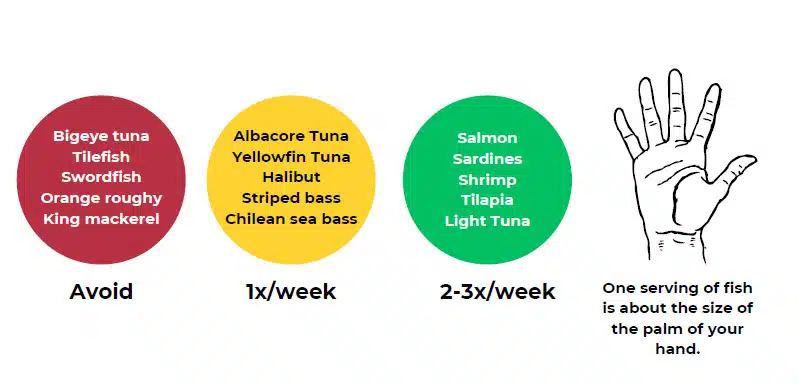
4. Managing Weight Gain During Pregnancy
Achieving a healthy weight during the prenatal stage, as advised by your healthcare provider, is crucial for supporting appropriate weight gain during pregnancy.
Extra calories are needed to support your baby’s growth, but approximately 300 extra calories a day are sufficient during the second and third trimesters. This can vary based on several factors, such as activity level and weight before pregnancy.
Factors impacting weight gain during pregnancy:
- Physical activity
- Quality of sleep
- Stress management
Adopting healthy lifestyle practices before and during pregnancy will contribute to achieving a healthy weight gain.
5. Healthy Eating Tips During Pregnancy
- Focus on making healthy food choices from all the major food groups: fruits, vegetables, whole grains, lean proteins, and dairy.
- Choose whole grains over refined grains to get more fiber and nutrients.
- Include a variety of colorful fruits and vegetables to ensure you’re getting enough vitamins and minerals.
- Opt for low-fat or fat-free dairy products for calcium and vitamin D.
- Incorporate healthy fats like those from avocados, nuts, and olive oil.
- Stay hydrated by drinking plenty of water throughout your pregnancy.
- Limit foods high in added sugars, saturated fats, and excess sodium.

6. The Role of Prenatal Vitamins
Even with a healthy diet, it can be challenging to get all the important nutrients your body needs from food alone. That’s why taking a daily prenatal vitamin is recommended to fill any nutritional gaps.
Key vitamins and minerals in prenatal supplements:
- Folic acid
- Iron
- Calcium
- Vitamin D
- Iodine
Note: Always consult with your healthcare provider before starting any prenatal supplements to ensure they’re safe during pregnancy and meet your specific needs.
7. Frequently Asked Questions
What is the meaning of prenatal nutrition?
Prenatal nutrition refers to the dietary intake and nutritional needs of a woman before and during pregnancy to support her health and the development of her baby.
What nutrition does a pregnant woman need?
A pregnant woman needs a variety of nutrients, including increased amounts of folic acid, iron, calcium, protein, and omega-3 fatty acids, to support the baby’s growth and her own health.
What is the best nutrient for pregnancy?
While all nutrients are important, folic acid is crucial in the early stages to prevent neural tube defects, and iron is essential to prevent anemia.
What is the best food prenatal?
A balanced diet rich in whole grains, lean proteins, fruits, vegetables, and dairy products is ideal. Salmon is an excellent choice due to its high content of omega-3 fatty acids.
Empower Your Pregnancy with Great Nutrition
Proper prenatal nutrition is essential for a healthy pregnancy and your baby’s development. By focusing on healthy eating, making informed food choices, and ensuring you get the right amount of vitamins and minerals, you can support your health and give your baby the best start in life.
Remember, it’s important to consult with your healthcare provider or a registered dietitian for personalized advice. They can help you create an eating plan that meets your nutritional needs throughout your pregnancy.
Check out more from Dr. Kristina Carman:
- Fertility and Nutrition: How a Fertility Diet Can Boost Your Chances
- The Menstrual Blueprint: Phases of the Menstrual Cycle
- What is Seed Cycling? Balance Hormones & Ease Menopause Symptoms
- Guide to Women’s Hormones & Health


